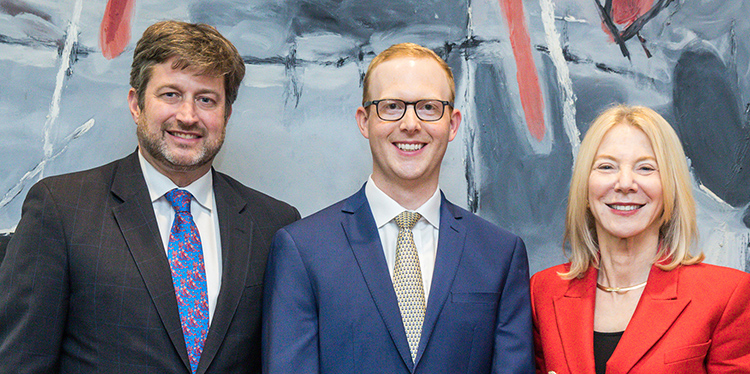Thom Mayne: Lifetime Achievement Award
 Thom Mayne, Cret Chair Professor of Practice in the department of architecture at Penn’s Weitzman School of Design, is this year’s recipient of the Association for Computer Aided Design in Architecture (ACADIA)’s Lifetime Achievement Award. He also delivered a keynote speech at the annual conference at the end of last month held at the University of Texas at Austin.
Thom Mayne, Cret Chair Professor of Practice in the department of architecture at Penn’s Weitzman School of Design, is this year’s recipient of the Association for Computer Aided Design in Architecture (ACADIA)’s Lifetime Achievement Award. He also delivered a keynote speech at the annual conference at the end of last month held at the University of Texas at Austin.
Mr. Mayne founded Morphosis in 1972 as a collective practice of architecture, urbanism and design, rooted in rigorous research and innovation. Working globally across a broad range of project types and scales, Morphosis is recognized for its innovative and sustainable designs for cultural, civic and academic institutions, including the Bloomberg Center at Cornell Tech, the Perot Museum of Nature and Science, and 41 Cooper Square, the academic building for The Cooper Union. As Founding Principal of Morphosis, Mr. Mayne provides overall vision and project leadership to the firm.
Mr. Mayne’s distinguished honors include the Pritzker Prize in 2005 and the AIA Gold Medal in 2013. He served on the President’s Committee on the Arts and Humanities under President Obama. With Morphosis, Mr. Mayne has been the recipient of 29 Progressive Architecture Awards, over 120 American Institute of Architecture Awards and numerous other design recognitions.
Rabie Shanti: Relationship-Based Care Award
 Rabie Shanti, who holds a joint appointment in the department of oral and maxillofacial surgery at Penn Dental and the department of otorhinolaryngology/head and neck surgery at PSOM, has been honored with the 2019 Relationship-Based Care Award by Pennsylvania Hospital. The award recognizes outstanding clinicians who fully embody the tenets of Relationship-Based Care: leadership, teamwork, professionalism, care delivery, resources and outcomes.
Rabie Shanti, who holds a joint appointment in the department of oral and maxillofacial surgery at Penn Dental and the department of otorhinolaryngology/head and neck surgery at PSOM, has been honored with the 2019 Relationship-Based Care Award by Pennsylvania Hospital. The award recognizes outstanding clinicians who fully embody the tenets of Relationship-Based Care: leadership, teamwork, professionalism, care delivery, resources and outcomes.
The relationship-based care model was established to ensure that patient needs and interests are top priority. Recipients of this award are recognized for their excellence in skillfully combining the art of caring and the science of health care in their clinical practice.
Men’s and Women’s Cross Country: 1st and 3rd Place, All-Ivy Honors
Racing at the Ivy League Heptagonal Cross Country Championships on November 1 in The Bronx, New York, Penn’s men’s cross country team placed first and the women placed third.
Seniors Maddie Villalba and Nia Akins and sophomore Ariana Gardizy earned All-Ivy honors, the first time in the history of the program that three runners have earned all-conference recognition. Ms. Villalba is a First-Team All-Ivy selection and Ms. Akins and Ms. Gardizy are Second-Team All-Ivy awardees.
Steve Dolan, the James P. Tuppeny/Betty J. Costanza Director of Track & Field/Cross Country, was named Ivy League Coach of the Year. Junior Anthony Russo earned first-team All-Ivy honors, while senior Will Daly and junior Ryan Renken earned second-team distinction.
MAR Designs, SchistoSpot: Catalyzer Awards
Penn Health-Tech’s Rothberg Catalyzer is a two-day makerthon that challenges interdisciplinary student teams to prototype and pitch medical devices that aim to address an unmet clinical need. The Catalyzer’s third competition was held recently and was won by MAR Designs, a team of mechanical engineering and applied mechanics graduate students: Rebecca Li, Ariella Mansfield and Michael Sobrepera.
MAR Designs took home $10,000 for their project, an orthotic device that children with cerebral palsy can more comfortably wear as they sleep. According to the team, existing wrist orthoses improve function and treat/prevent spasticity but are uncomfortable. MAR Designs’ device initially allows full range of motion, but gradually straightens the wrist as the child is falling asleep.
SchistoSpot took home the Pioneer Award. Bioengineering and computer and information science seniors Alec Bayliff, Bram Bruno, Justin Swirbul and Vishal Tien designed a low-cost microscopy system that can aid in the diagnosis of the parasitic disease schistosomiasis.
The Daily Pennsylvanian won the prestigious Pacemaker award, an annual accolade given out by the Associated Collegiate Press that is commonly referred to as the “Pulitzer Prize” of college journalism, for the third year in a row. Before 2017, the DP had not won the award for five years, according to the DP.
This year, The DP was one of 15 publications total and the only Ivy League newspaper to win the award. Other winners included papers from UCLA, Syracuse, Texas A&M, University of Alabama, Kent State, NYU and Elon.
The DP also took home several other awards and honorable mentions. Former DP Senior Sports Editor and 2019 College graduate William Snow won the 2019 ACP/Ernie Pyle Reporter of the Year award. Mr. Snow’s winning submissions included the volleyball investigation, a column on why he never belonged at Penn and an investigation into concussions on Penn’s sprint football team. Senior Multimedia Editor and College junior Chase Sutton won first place for the Sports Photo of the Year, according to the DP.
To enter, college newspapers submit five representative issues to the ACP.
Penn: Most Grads on the Forbes 400
Forbes recently ranked colleges and universities with the most graduates who are members of The Forbes 400, the publication’s list of the wealthiest Americans. It does not include college dropouts like Bill Gates or Mark Zuckerberg. The 79 percent of Forbes 400 members who are college graduates went to a total of 155 schools.
According to the story, Penn “top[ped] the list thanks largely to its renowned business school, Wharton. The cofounder of Tesla and SpaceX, Elon Musk, for one, has said that his interest in space and electronic vehicles started when he was a student at Wharton. Jonathan Gray majored in business and English at Penn .... He started as an asset manager at Blackstone Group and later ascended to the head of the firm’s real estate group. He is now COO and president and is considered a potential successor to cofounder and CEO Stephen Schwarzman. President Donald Trump, who transferred there from Fordham University in the Bronx, Emerson Collective founder Laurene Powell Jobs and investors Howard Marks and Ronald Perelman also got their undergraduate degrees from Penn.”
Moelis Fellowships: Supporting Diversity Among Students Pursuing Planning Careers

 This fall, as part of ongoing efforts to support diversity within the Weitzman School, the department of city and regional planning is welcoming the first cohort of Moelis Scholars, a new program open to African-American and Latinx students who are thinking about pursuing careers in housing and community and economic development.
This fall, as part of ongoing efforts to support diversity within the Weitzman School, the department of city and regional planning is welcoming the first cohort of Moelis Scholars, a new program open to African-American and Latinx students who are thinking about pursuing careers in housing and community and economic development.
The Moelis Scholars Program supports students of color in the master of city planning program with tuition remission and other benefits. The goal is not just to bring people from a range of backgrounds into the planning discipline, but to help them find a way into the private development world as well, said Ron Moelis (C’78 W’78), CEO and founding partner of L+M Development Partners and the primary supporter of the new fellowship program.
“Diversity is a priority across our business, whether it be within our team, on our jobsites or in the communities where we work. We have a number of initiatives that are focused on bolstering diversity in the industry, including working with Minority and Women Owned Businesses (M/WBEs) on our construction projects and partnering with non-profits to deliver skills training,” Mr. Moelis said.
The first cohort of Moelis Scholars includes Eboni Senai Hawkins from Chicago, Illinois, and Sean Dajour Smith from Grand Rapids, Michigan.
Mr. Moelis said that in the last five or 10 years, as rising land costs, zoning challenges, affordability and gentrification have become much bigger issues in American cities, the process of working with communities on development projects has become more important.
“Our work is centered around the idea that building and preserving affordable housing goes hand-in-hand with social responsibility. Our team demonstrates that every day by working with residents, non-profits and elected officials to identify ways we can help strengthen communities. That might mean partnering with a non-profit to deliver a construction training program or provide an after-school program at one of our properties.”
Entering any community with development plans can be met with skepticism, distrust and fear, Mr. Moelis said, but he is committed to bringing forward ideas that overcome these trepidations and deliver positive outcomes for residents.
“The best way to cultivate innovative and smart thinking is by having diversity of thought,” Mr. Moelis said. “Diversity of thought is created by bringing a wide range of experiences, views and values to the table. By comparing and contrasting these differences, some really original ideas can be born and brought to the forefront.”
Applicants to the Moelis Scholars program are asked to write an essay describing their “dream job” 10 years into the future, and how a master’s in city planning would help them achieve it. For Mr. Moelis, it was a slow process to build a development career. After graduating from Penn, he went to law school and spent a few months practicing as an attorney. At the time, the federal government was changing its approach to housing, making tax credits available for private developers to build affordable-housing projects. Mr. Moelis and his partner, Sanford Loewentheil, began dabbling in housing development and slowly built a business.
“I enjoyed the intellectual challenge, that I was successful at it, and I thought it was morally something that I felt good about doing,” Mr. Moelis said.
Moelis Scholars get a range of support, including two years of tuition remission, a research stipend, help finding paid summer internships, funding to attend the annual National Planning Conference and a year’s membership in the American Planning Association after they finish the master’s program. The program is a complement to the Penn Planning Equity Initiative, an agenda of research and public programming focused on urban inequality.
“The Moelis Scholars Program enables our students to expand on their academic studies by taking advantage of opportunities supported by Ron,” said Fritz Steiner, dean of the Weitzman School. “The Program also supports key initiatives related to inclusion and diversity within the city and regional planning department.”
Above all, Scholars are meant to benefit from mentorship by a faculty member and eventually, by an alumnus of the program who was a Scholar. Mr. Moelis visited campus for a meeting with the students at the beginning of September. He said he told the students that he hoped they would excel academically. But it was more important, he said, that they would come back to the School after they begin their careers and work with future Scholars, so the program builds on itself and “becomes a self-fulfilling prophecy.”
“The academic experience here is great, but education is also about the ability to learn from people who’ve done it before and to grow that way,” Mr. Moelis said. “I think that’s really what we’re trying to drive here: more diversity but also more of an ongoing presence where people can give back.”
Analytics at Wharton’s First-ever Roster of Funding Recipients
Analytics at Wharton has selected eight projects as inaugural recipients of the newly created Data Science and Business Analytics Fund. The projects, chosen from 23 proposals submitted from around Wharton, will focus on a range of topics and include: predictive analytics to detect financial irregularities, machine learning as a tool for human resources and the creation of a new Women in Analytics conference. A formal call for submissions solicited proposals that demonstrate the need for financial support and infrastructure to enhance faculty research, student learning opportunities and engagement with industry and alumni.
“We are delighted by the quantity and caliber of the proposals submitted to Analytics at Wharton’s Data Science and Business Analytics Fund,” said Vice Dean of Analytics Eric T. Bradlow, also professor of marketing, economics, education and statistics and the chair of Wharton’s marketing department. “All of the proposals were intriguing in their own way and collectively reflect the incredible breadth of analytics knowledge being created at Wharton.”
Thanks to an anonymous $15 million gift, the Wharton School launched Analytics at Wharton in May 2019 to unite the School’s trailblazing teaching, research and industry engagement initiatives that use big data to improve decision-making and generate actionable business insights. The Data Science and Business Analytics Fund’s goal is to accelerate Wharton’s innovations in applying sophisticated analytical tools to solve challenges and leverage the opportunities for business and society generated by the data and technology revolution. This gift is an instrumental investment in analytics, a core area of focus of Wharton’s More Than Ever campaign.
“At Wharton, the keystone of our research has always been the creation of knowledge through the analysis of empirical data,” said Michael R. Gibbons, Wharton School deputy dean and professor of finance. “The Data Science and Business Analytics Fund and the projects it seeds will further elevate Wharton’s dominant reputation in the area of predictive analytics.”
The inaugural Data Science and Business Analytics Fund recipients are:
Data Science for Finance submitted by Michael R. Roberts, professor of finance
This funding supports the development of a new course: Data Science for Finance. The course will highlight how big data and data analytics shape the way finance is practiced, and will introduce students to data science for financial applications using the Python programming language and its ecosystem of packages (e.g., Dask, Matplotlib, Numpy, Numba, Pandas, SciPy, Scikit-Learn, StatsModels). To do so, students will investigate a variety of empirical questions from different areas within finance including: fintech, investment management, corporate finance, corporate governance, venture capital, private equity and entrepreneurial finance.
Effective Text Processing in New Domains: Transfer Learning for Word Embeddings, submitted by Hamsa Bastani, assistant professor of operations, information and decisions
While modern data analytics are incredibly effective at extracting valuable insight from text data (e.g., product reviews, nurses’ notes, etc.), they require an enormous amount of data. This research seeks to increase the applicability of state-of-the-art text analytics algorithms by transferring word embeddings for large-scale data to domains with small- and medium-scale datasets.
Environmental, Social and Governance Analytics, submitted by Witold Henisz, professor of management; director, Wharton Political Risk Lab
This project focuses on analyzing the materiality of businesses’ environmental, social and governance risks and opportunities and promotes faculty research, teaching and student learning in this area.
People Analytics Video Project, submitted by Laura Zarrow, executive director of Wharton People Analytics
Wharton People Analytics will produce a slate of instructive, engaging, 5- to 15-minute videos from previous conferences and events that illuminate aspects of people analytics for students, industry professionals and alumni.
The Promise and Peril of Algorithms in Human Resources, submitted by Prasanna Tambe, associate professor of operations, information and decisions
This research project conducts an empirical exploration of the relative costs and benefits of using machine learning-based tools on video job application data during the hiring process.
The Science of the Deal: Deep Reinforcement Learning for Optimal Bargaining on eBay, submitted by Assistant Professor of Operations, Information and Decisions Etan A. Green
This research project trains an artificial intelligence to make optimal offers in negotiations on eBay.
Wharton Forensic Analytics Lab, submitted by Daniel Taylor, associate professor of accounting
This project will develop research and teaching expertise on the application of big data and predictive analytics to issues related to insider trading, financial irregularities and fraud. The Lab will aim to create new tools and technologies, academic research and teaching and educational materials.
Women in Analytics and Data Science Conference, submitted by Mary Purk, executive director of Wharton Customer Analytics and Linda Zhao, professor of statistics
This conference for Penn students aims to inspire and educate data scientists, regardless of gender, and support women in analytics and data science-related careers. Planned for February 14, 2020 on Penn’s campus, this event is part of the larger Women in Data Science (WiDS) initiative originated at Stanford in November 2015 and includes a global conference, 150+ regional events, a datathon and numerous podcasts.


 Michael Hanchard, professor and chair of Africana studies, has been named Gustave C. Kuemmerle Professor of Africana Studies. Before coming to Penn in 2015, Dr. Hanchard was the SOBA Presidential Professor of Political Science at Johns Hopkins University, where he directed the Racism, Immigration and Citizenship Program and served as Chair of the Provost’s Advisory Committee.
Michael Hanchard, professor and chair of Africana studies, has been named Gustave C. Kuemmerle Professor of Africana Studies. Before coming to Penn in 2015, Dr. Hanchard was the SOBA Presidential Professor of Political Science at Johns Hopkins University, where he directed the Racism, Immigration and Citizenship Program and served as Chair of the Provost’s Advisory Committee.  Melissa E. Sanchez, professor of English, has been appointed Donald T. Regan Professor of English. Dr. Sanchez’s research and teaching focus on feminism, queer theory and 16th- and 17th-century literature, including the works of William Shakespeare and Edmund Spenser. She has made significant contributions to early modern studies in her books Erotic Subjects: The Sexuality of Politics in Early Modern English Literature, Queer Faith: Reading Promiscuity and Race in the Secular Love Tradition, and Shakespeare and Queer Theory, as well as three edited volumes and numerous peer-reviewed articles. Currently, she is editing the Routledge Companion to Queer Literary Studies and has begun two new book-length projects, “What Were Women Writers?” and “Feminism Now: Method and Affect.”
Melissa E. Sanchez, professor of English, has been appointed Donald T. Regan Professor of English. Dr. Sanchez’s research and teaching focus on feminism, queer theory and 16th- and 17th-century literature, including the works of William Shakespeare and Edmund Spenser. She has made significant contributions to early modern studies in her books Erotic Subjects: The Sexuality of Politics in Early Modern English Literature, Queer Faith: Reading Promiscuity and Race in the Secular Love Tradition, and Shakespeare and Queer Theory, as well as three edited volumes and numerous peer-reviewed articles. Currently, she is editing the Routledge Companion to Queer Literary Studies and has begun two new book-length projects, “What Were Women Writers?” and “Feminism Now: Method and Affect.” 
 ICA recently welcomed two new staff members, Taja Jones as associate director of development, and Amanda Silberling, 2019-2020 Van Doren Fellow.
ICA recently welcomed two new staff members, Taja Jones as associate director of development, and Amanda Silberling, 2019-2020 Van Doren Fellow.
 Thom Mayne, Cret Chair Professor of Practice in the department of architecture at Penn’s Weitzman School of Design, is this year’s recipient of the Association for Computer Aided Design in Architecture (ACADIA)’s Lifetime Achievement Award. He also delivered a keynote speech at the annual conference at the end of last month held at the University of Texas at Austin.
Thom Mayne, Cret Chair Professor of Practice in the department of architecture at Penn’s Weitzman School of Design, is this year’s recipient of the Association for Computer Aided Design in Architecture (ACADIA)’s Lifetime Achievement Award. He also delivered a keynote speech at the annual conference at the end of last month held at the University of Texas at Austin.  Rabie Shanti, who holds a joint appointment in the department of oral and maxillofacial surgery at Penn Dental and the department of otorhinolaryngology/head and neck surgery at PSOM, has been honored with the 2019 Relationship-Based Care Award by Pennsylvania Hospital. The award recognizes outstanding clinicians who fully embody the tenets of Relationship-Based Care: leadership, teamwork, professionalism, care delivery, resources and outcomes.
Rabie Shanti, who holds a joint appointment in the department of oral and maxillofacial surgery at Penn Dental and the department of otorhinolaryngology/head and neck surgery at PSOM, has been honored with the 2019 Relationship-Based Care Award by Pennsylvania Hospital. The award recognizes outstanding clinicians who fully embody the tenets of Relationship-Based Care: leadership, teamwork, professionalism, care delivery, resources and outcomes.
 This fall, as part of ongoing efforts to support diversity within the Weitzman School, the department of city and regional planning is welcoming the first cohort of Moelis Scholars, a new program open to African-American and Latinx students who are thinking about pursuing careers in housing and community and economic development.
This fall, as part of ongoing efforts to support diversity within the Weitzman School, the department of city and regional planning is welcoming the first cohort of Moelis Scholars, a new program open to African-American and Latinx students who are thinking about pursuing careers in housing and community and economic development. The Annenberg Center heats up Philly’s jazz scene in November, honoring the legacy of jazz great Art Blakey with Messenger Legacy, on Saturday, November 16 at 8 p.m., and introducing jazz vibraphonist Joel Ross to Philadelphia in his headline debut, Thursday, November 21 at 7:30 p.m. Visit
The Annenberg Center heats up Philly’s jazz scene in November, honoring the legacy of jazz great Art Blakey with Messenger Legacy, on Saturday, November 16 at 8 p.m., and introducing jazz vibraphonist Joel Ross to Philadelphia in his headline debut, Thursday, November 21 at 7:30 p.m. Visit 

